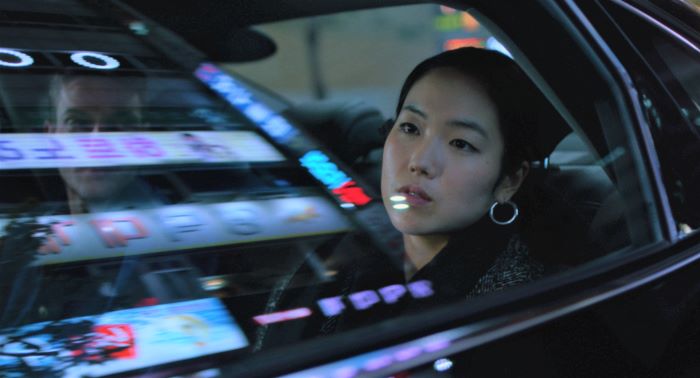Identity and freedom are explored with rare power and style in Cambodian-French director Davy Chou’s second feature. Twenty-five-year-old Frédérique “Freddie” Benoît (Park Ji-min) was born in Seoul, but adopted by a French family, and she returns to South Korea on a whim, and seeks her biological parents as an afterthought while there. The film succeeds in capturing Freddie’s unsettled, in-between existence. Her freedom of being from two places gives her a certain power, but also a gnawing sadness. It is a simple story that contains an epic quality as she evolves over roughly a decade from a carefree young woman to a complex person who learns to grapple with her scars.
Freddie has lived in France her whole life and speaks only French and a little English. In Seoul, she has a friend, Tena (Guka Han), who translates everything for her, and enjoys the nightlife and engages in a one-night stand with a local man. She quickly realizes that her French joie de vivre gives her a certain power over Korean men, who are a bit shyer than she’s used to, and she enjoys having this clout while taking advantage of the vibrant nightlife.
Freddie eventually inquires about her birth parents. However, the adoption agency has strict rules about contacting parents—the center acts as a go-between and has a system in place so that the parents can choose whether they want to respond. (It will only send one telegram per year so that the parents aren’t hounded.) Freddie’s father is enthusiastic about meeting her, and so she takes a bus out with Tena to the small fishing village where he lives with his wife and two daughters. Her mother doesn’t respond.
Her father, an air conditioning repairer, regrets putting her up for adoption, and wants her to live with him and his family. He can sense that she is hesitant and anxious, but he says that everything will be better once she learns Korean. He also calls her by her Korean birth name, Yeon-hee, which means “docile and joyful.” Freddie is very conflicted for the three days she spends at her father’s house, and is relieved when she gets back to Seoul, where she continues to go out drinking and dancing with friends.
She doesn’t want to be Yeon-hee, but being Freddie also seems like it isn’t enough anymore. So, she becomes someone else. Two years go by, and she has been living in Seoul as kind of a femme fatale, using her looks (someone says she has classic Korean features) and her French confidence to get what she wants. (She never makes much progress in learning Korean.) The friends she had when she first came to Seoul haven’t gone with her on this transformation—they are intimidated by her. She also has kept her father at a distance; he has a habit of getting drunk and sending her emotional text messages. She hates it and doesn’t respond. She loses herself in the nightlife, and her rootlessness gives her freedom, but there’s also a loneliness she can’t shake. She can do whatever she wants in Seoul, but it still isn’t quite home.
When she matches on Tinder with a French weapons dealer, André (Louis-Do de Lencquesaing), who is visiting Seoul on a business trip, he sees potential in her and tells her she would be perfect for his line of work. It requires “never looking back,” and he can tell that she has that quality. Never looking back gives her a certain strength, but it’s also a burden to bear.
Park’s performance as Freddie is surely one of the year’s best. Her transformation—from unassuming 25-year-old bohemian to confident international arms dealer and finally into someone who accepts her past and stops running away from it—is subtle and believable. Her character arc may sound outlandish, but she brings you along step-by-step, and it all feels natural. Viewers also get to discover South Korea along with her, from the bright lights of Seoul to the quiet countryside.
An engrossing study of how a young woman’s search for identity takes her in places she never expected, Return to Seoul is highly recommended.







Leave A Comment